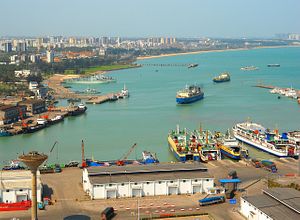China is considering an update to its 1984 Maritime Traffic Safety Law. According to Xinhua, China’s state news agency, the Legislative Affairs Office of the State Council announced earlier this week that it would consider revisions to restrict the navigation of foreign vessels in Chinese territorial waters.
Parts of the proposed revision, according to Chinese reports, may present a challenge to internationally-accepted norms around freedom of navigation and stands to raise tensions between Beijing and the United States — but also Southeast Asian claimants — in the South China Sea.
The announcement of the drafting process isn’t entirely surprising. Early last year, China had announced in the draft outline of its 13th Five-Year Plan, which was announced at the fifth plenum in late 2015, that it would revisit its existing maritime law to empower its maritime law enforcement agencies.
Among the provisions under consideration, the Legislative Affairs Office of the State Council is considering strict restrictions on how foreign vessels would be allowed to enter Chinese territorial waters.
Territorial waters under the United Nations Convention on the Law of the Sea (UNCLOS) are demarcated at 12-nautical-miles from baselines — in most cases a shore.
China is a signatory to UNCLOS and has declared baselines around the Paracel Islands in violation of the agreement. It has yet to declare baselines in the Spratly group, where it has constructed seven artificial islands.
A People’s Daily account of the draft law notes that “foreign ships that enter Chinese waters without approval will be fined 300,000-500,000 yuan ($43,706-$72,844) and those violating Chinese laws would be expelled.”
Under UNCLOS, vessels do not require prior notification for certain kinds of transit — notably innocent passage — through territorial waters. The U.S. Navy’s freedom of navigation operations in the South China Sea have protested this Chinese requirement. (China isn’t the only regional state to require prior notification in violation of UNCLOS; Vietnam requires it as well, for example.)
“The draft would empower maritime authorities to prevent foreign ships from entering Chinese waters if it is decided that the ships may harm traffic safety and order,” the People’s Daily added.
The draft law would also look to restrict the passage of “foreign submersibles,” according to the Global Times. These vessels “should travel on the surface, display national flags, and report to Chinese maritime management administrations when they pass China’s water areas,” it noted.
As Julian Ku, an international law expert and China-watcher observed, the draft law would largely “codify existing Chinese practice.” In practice, the U.S. Navy would continue to assert freedom of navigation as understood under customary law. (The United States is not party to UNCLOS, but treats the international convention as customary law.)
The revisions under consideration appear to largely codify China’s differentiation between freedom of navigation for civilian vessels and military vessels. Beijing publicly claims to support freedom of navigation as a principle, but objects to the United States’ lawful naval activities, including surveillance within its exclusive economic zone and innocent passage within claimed territorial sea.
The revisions to the 1984 law are expected to take effect in 2020, at the conclusion of China’s 13th Five-Year Plan.

































